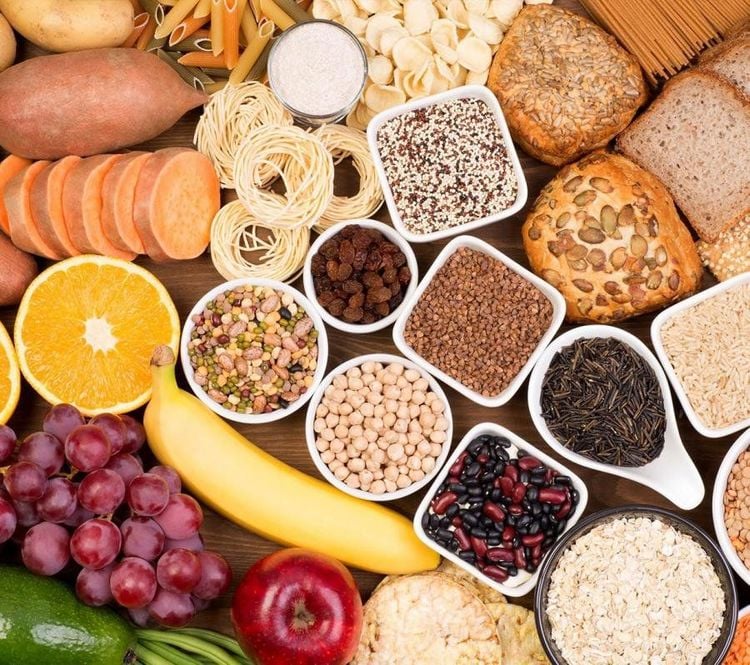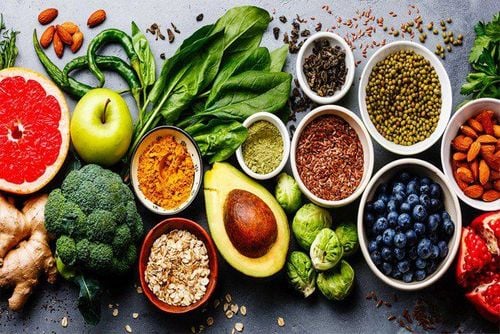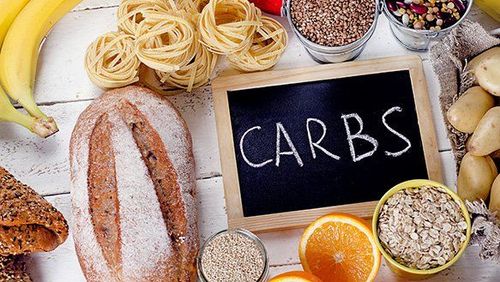This is an automatically translated article.
Carbohydrates are the reason for weight gain. But carbohydrates are not all bad, it has a lot of benefits for human health. In fact, to grow and develop, humans need carbohydrates.1. Correct understanding of carbohydrates
Carbohydrates are a macronutrient found in many foods and drinks. Most natural carbohydrates are found in plant foods (such as grains). Food manufacturers also add carbohydrates in the form of added sugars or starches to processed foods.Common natural sources of carbohydrates include:
Fruits Vegetables Milk Nuts Grains Sprouts Legumes
2. Carbohydrates
Carbohydrates can be divided into three main categories:Sugar: Sugar is the simplest form of carbohydrate and occurs naturally in a number of foods, including fruits, fresh vegetables, milk and dairy products. Sugars include fruit sugar (fructose), granulated sugar (sucrose), and milk sugar (lactose). Starch: Starch is a complex carbohydrate, which has a structure of many sugar units linked together. Starch exists naturally in cooked vegetables, grains, and legumes. Fiber: Fiber also belongs to the category of complex carbohydrates. It occurs naturally in fruits, vegetables, whole grains, and cooked legumes.

Đường là dạng carbohydrate đơn giản nhất và xuất hiện tự nhiên trong một số loại thức ăn
3. Carbohydrate terms: net carbs and glycemic load index
There are several terms that often appear on product labels, such as “net carbs” (“net carbs”). However, the Food and Drug Administration (FDA) has not regulated such terms, so at the moment there is no official definition. Usually “net carbs” is used to mean the total mass of carbohydrates in a product excluding fiber, or excluding both fiber and sugar alcohols.Another term is the glycemic index (GI). The glycemic load index classifies carbohydrate foods according to their ability to raise blood sugar.
Weight loss diets based on the glycemic index often guide the restriction of foods with a high glycemic index. Foods with a high glycemic load include potatoes and white bread, junk food, and desserts containing refined flour.
A lot of healthy foods (such as whole grains, legumes, fresh vegetables, fruits, skim milk products, etc.) often have a low glycemic load. .
4. How much carbohydrate is needed per day?
The Nutritional Guidelines for Americans recommend that carbohydrate intake be 45 to 65% of total daily energy intake.Thus, if the total amount of energy per day is 2000 calories, the amount of energy provided by carbohydrates will fall into the range of 900 - 1300 calories, equivalent to the amount of carbohydrates eaten per day is 225 - 325 g.
Information on carbohydrate composition can be found on the label on food packaging, in the nutrition information section. This information will show the total amount of carbohydrates, including starch, fiber, sugar alcohols, natural sugars and added sugars. The label may also include information about total fiber, soluble fiber, and sugar separately.
5. Carbohydrates with human health

Đối ngược với tiếng xấu, carbohydrate là thành phần thiết yếu đối với sức khỏe con người với nhiều lí do
Energy supply: carbohydrates are the body's main source of energy. During digestion, sugars and starches are broken down into simple sugars. They are then absorbed into the bloodstream, and are known as blood sugar (glucose). From here, glucose enters the body's cells with the help of the hormone insulin. Glucose is used by the body to create energy, serving all human activities. Excess glucose will be stored in the liver, muscles and some other cells for later use or will be converted into fat. Protect against disease: Some evidence suggests that whole grains and dietary fiber from whole foods reduce the risk of cardiovascular disease. Fiber also protects people against obesity and type 2 diabetes. Fiber is also an indispensable component for a healthy digestive system. Weight control: There's a lot of evidence that eating more fruits, fresh vegetables, and whole grains can help manage weight. These foods help the body feel full longer, while providing less energy, so weight is controlled. Contrary to what the low-carb diet claims, very few studies have shown that a diet rich in beneficial carbohydrates leads to weight gain or obesity.
6. Be smart when choosing carbohydrate sources

Tập trung vào rau tươi và hoa quả giàu chất xơ
Focus on fresh vegetables and high-fiber fruits: focus on fresh, frozen whole fruits and vegetables or canned but with no added sugar. Other options are fruit juices and dried fruit, which are natural sources of sugar and therefore provide a higher amount of energy. Whole fresh fruits and vegetables are rich in fiber, which helps the body feel full for longer while consuming less energy. Choose whole grains: Whole grains are better than refined grains, because they're rich in fiber and other important nutrients (like B vitamins). Grains after going through the refining process will no longer retain their original composition. Choose skim milk products: Dairy products are a valuable source of nutrients, and try to choose low-fat varieties to limit your energy intake as well as the amount of saturated fat. Do not choose products with added sugar. Eat legume foods: common beans, peas, lentils are easy to find and valuable sources of nutrients. They are low in fat but rich in folate, potassium, iron and magnesium, plus fiber. Legumes are rich in protein and can be substituted for animal protein sources. Limit added sugars: A small amount of added sugar may not cause any harm, but there isn't any benefit to consuming added sugar in any amount. For a healthy body, choose your carbohydrate sources wisely!
Articles referenced: Mayoclinic.org
Everything about a healthy diet: Fats, proteins, carbohydrates, fiber, calcium, iron, folic acid Low Carb, High Carb, Bad Carb: How Much is the best? Can low-carb diets really help you lose weight?













